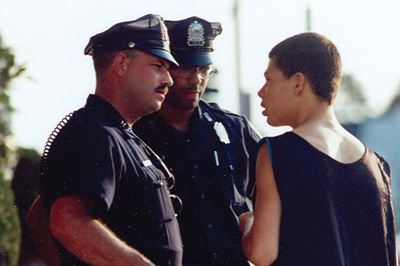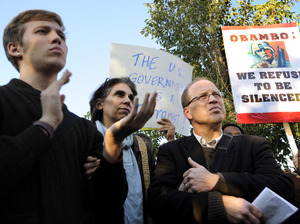Podcast: Play in new window | Download
Updates:
- Newburgh Four Update
- After 20 Years Still No Charges In Alex Odeh Assassination
- Four Cases on National Security:
- Anwar Al-Aulaqi Case – Drones Targeting US Citizens – Obama Wants To Dismiss CCR/ACLU Case
- CCR Guantanamo So Called Suicide Cases
- Supreme Court Will Not Review Case On Feds Wiretapping Guantanamo Lawyers
- Bombing of the USS Cole – Could Prosecutors Use The Fruit From the Poisonous Tree?
—-
NYC NLG Street Law and Racial Profiling Program
Today we’re joined by Paula Segal and Gabriela Lopez with the New York City Lawyers Guild Street Law Clinic Program. The project sends groups of attorneys to conduct “Street Law” workshops with a range of students in high school. We’re also joined by students from the Aarturo A. Schomburg Satellite Academy High School who were part of the street law classes.
Street Law Students:
- In my neighborhood it’s really common for the Police to bother you for no reason. I don’t think they had the right to go into my pockets unless they had reasonable suspicion. This happens at least 3 times a week.
- One time they took me into the precinct, took my picture, ran my fingerprints.
- I was getting off the train and these two big police men were getting off the train and they stopped me. They said we have her on the walkie-talkie. This women said take off your sneakers. She kept asking, where is it? Where is it? That’s when she started to get physical and she lifted up my shirt. “If you don’t f-in’ tell me where it’s at, I’m going to strip search you. It happened on Elder Avenue, next to the 6 train.
- They say no, we’re not going to touch you, then he throws me on the car.
- You guys are unfolding my socks right now, and I don’t like this. There’s a certain way that I fold my socks.
- After they find nothing, they say you should change your attitude. I said, you should change your attitude.
- A lot of cops judge character, when I see cops, you have to give them an expression. Hey look I’m out here, I’m not tryin to get in that car.
- I’m thinking about the cops catching the real villans. If you’re really guilty you’re going to get hassled, if you’re not guilty,then you can be free. The advice I get from the street law project is not consenting to the search.
- From my knowledge, the cops need a certain amount of arrests at the end of the month, so they’ll pick on anybody. They curse a lot. Undercover cops, they’ll probably have on a hoodie, try to fit in with everybody else, it just don’t work.
- Law Student Paula Segal: We focus on giving people tools to walk away, to avoid arrest.
- Law Student, Street Law Coordinator Gabriella Lopez: Last year we went to more than sixty different sites. Sixty to Seventy different trainings that occured last year.
- Email the Street Law Team – streetlawteam@gmail.com
Guests – Paula Segal and Gabriela Lopez with the New York City Lawyers Guild Street Law Clinic Program. Aarturo A. Schomburg Satellite Academy High School Students: Charisma Whaley / Joseph Campbell / Kiara Avila / Stephanie Colon / Jonathan Jeffries.
—-
Grand Juries Historically and the Minneapolis / Chicago FBI Raids
A total of 12 people were served with subpoenas during last months FBI raids in Minneapolis and Chicago. The FBI targeted anti-war peace activists and key organizers of demonstrations and marches who have been asked to appear before a grand jury. What is a grand jury? Historically, a grand jury was supposed to be citizens coming together to determine if charges should be filed criminally against someone. Today, it’s very different. It’s mostly a rubber stamp for what the prosecutors want. If you refuse to testify at a grand jury, you can be taken to a judge to answer questions. If you refuse to answer those questions you could be put in jail.
Margaret Ratner-Kunstler:
- If you were subpoenaed before a grand jury in 1968 and you asserted your grand jury right, then that really was the end of your participation in the grand jury.
- You asserted immunity and if you we’re given immunity, you couldn’t be indicted.
- Immunity: Nothing you say could be used against you, but anything you testified about could not be the subject of a criminal indictment against you. Your words could not be held against you, or the fruits of those words. But it’s so easy to get around that, by a prosecutor saying, this didn’t come from this.
- If you then refused to testify given this minor immunity, you could be subject to imprisonment.
- If you refuse to testify you’re brought back before the judge and the judge then holds you in “civil contempt.”
- The grand jury is usually about 18 months. The grand jury in Chicago is a special grand jury which means it’s twice as long.
- That’s important because if you’re held in civil contempt, the keys to the jail are in your pocket. You’re in jail for as long as you refuse to testify.
- If you say something you could wave your fifth amendment right by already saying something.
- The recent FBI raids represents the tremendous see-change we have in terms of the ability for people to actively oppose this government’s policy.
- In 1983, there were many groups in this country who were joining forces with progressive groups in Central America. You had the Committee in Solidarity With the People Of El Salvador.
- Each of the 11 individual persons subpeoned wrote letters to the Attorney General saying that they would assert their fifth amendment right and that they would not testify.
- If they can’t get you on a federal charge it’s often that they’re looking for a mistake you made in conversation, even an informal conversation with a federal official.
Guest – Magaret Ratner-Kunstler, an attorney in private practice. As education director at the Center for Constitutional Rights, she originated the Movement Support Network and authored “If an Agent Knocks.” Kunstler is the President of the William Moses Kunstler Fund for Racial Justice, a foundation established in 1995 in the memory of her late husband to combat racism in the criminal justice system.
———————


